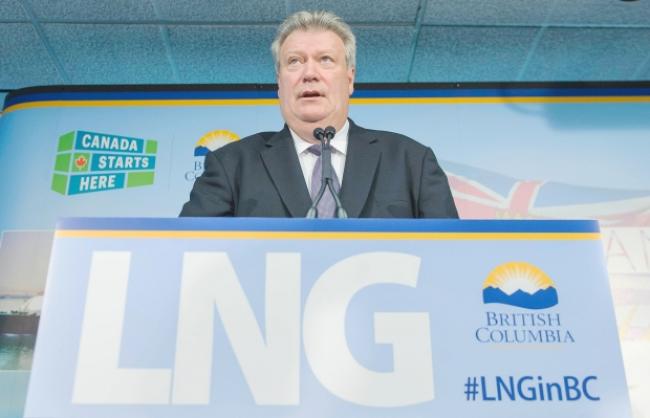Articles Menu

VICTORIA — Cabinet minister Rich Coleman admitted to being caught off guard this week by news of potentially “catastrophic” lapses in safety at the Malaysian operations of Petronas, the company the B.C. Liberals are counting on to build the first liquefied natural gas terminal here in B.C.
“I had not had a chance to see it or read it,” Coleman told me Friday, referring to the 732-page audit that exposed concerns ranging from decades-long delays in inspections to corrosion that endangered the structural integrity of the company’s offshore oil and gas platforms.
Several problems identified by the auditors were so severe as to have possibly lethal consequences, according to a report by Peter O’Neil in The Vancouver Sun Friday.
Still, in characteristic fashion — not for nothing is Coleman Premier Christy Clark’s go-to-guy on the LNG file and multiple other issues — the province’s deputy premier and minister for natural gas development proceeded to explain why the findings should not be any cause for concern here in B.C.
The audit was “a couple of years old” and Petronas had commissioned the work itself, which Coleman found reassuring in a self-policing sort of way.
Coleman further qualified the findings by noting that the audit focused on the company’s offshore drilling for oil and gas, not the onshore production of liquefied natural gas. On LNG, he claimed, “their record is impeccable.”
He also pointed out that Petronas is only one of five partners in the consortium that is proposing the multi-billion-dollar Pacific NorthWest LNG project. The others are from Japan, China, India and Brunei.
Yes, but Petronas is the lead partner and the Malaysian-government owned company has been front and centre in all dealings with Coleman, Clark and the other Liberals.
Coleman purported to find additional reassurance in the prospect that the Petronas share of the B.C. operations will be overseen by Progress Energy, the Calgary-based company that the Malaysians bought up in 2012. “They have a good record,” he told me.
Not entirely. Two years ago, the Sun’s Gordon Hoekstra reported that the B.C. Oil and Gas Commission had cited the company over its B.C. operation: “The company was ordered to identify the source of contaminants in a water storage area that may have caused harm to waterfowl (and) also ordered to make changes to prevent harm to waterfowl at all its facilities. That included the use of netting and the removal of any visible oil substances.”
Plus, Progress has twice been linked to earthquakes of magnitude greater than 4 in connection with its fracking operations in northeastern B.C.
By this point in the telephone interview, Coleman’s efforts to minimize the Petronas connection were echoing those of the company itself. When O’Neil asked the company about an explosion at one of its pipelines back in 2014, a Petronas representative referred to the fact that TransCanada Pipeline had been retained to build the line that would feed Pacific NorthWest LNG.Translation: Never mind our safety record because we won’t be building the pipeline, you will.
Safety and maintenance aren’t the only potential concerns plaguing Petronas these days. The company is a major source of revenue for the Malaysian government and that government is mired in scandal.
Among other eye-brow-raising details, the Wall Street Journal reported earlier this year that the sum of $700 million had turned up in the bank account of Prime Minister Najib Razak. The government acknowledged the deposit, but insisted that it did not arise from misappropriation of funds but rather a donation by un-named interests from the Middle East. (Phew! Nothing suspicions about that.)
I asked Coleman if he were concerned about the possible fallout. Not at this distance, he replied, because in his estimation it was not likely to touch on Petronas. “I do know that the company is solid. The management is solid.”
Besides, he added, whoever oversees Pacific NorthWest LNG will be subject to B.C. law, regulations and inspections. “We’re setting world-class standards and anyone coming here will have to meet those.”
I wondered if First Nations would be as confident. The proposed terminal would be located in the traditional territory of the Lax Kw’alaams First Nation, some of whose members are already camped on the site in opposition to the project because of the likely impact on the fishery.
The company has produced studies to show the fishery won’t be harmed. The band has commissioned its own studies to the contrary. How likely will the natives come around to the Petronas way of thinking in light of what the audit says about its safety record?
But even on that score, Coleman professed optimism. A lot of work has been done on the fisheries concerns, he insisted. “Everyone is getting to a much more comfortable position.”
In short, neither safety concerns nor a dubious environmental record nor that mysterious $700 million will shake Rich Coleman’s confidence in Petronas and the likelihood that it will go ahead and build here in B.C.
“I’m bullish,” he told me. Bullish. Change the spelling of that word slightly, and you’ve got another way of looking at it.
[End of article]